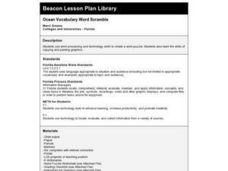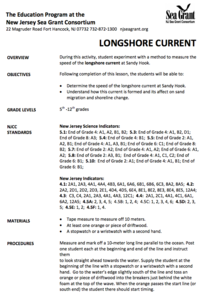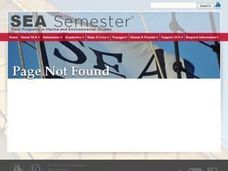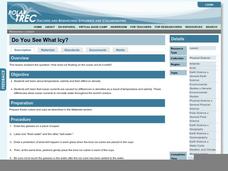Curated OER
Ocean Exploration
Students explore a simulated ocean floor. In this environmental lesson plan, students take on roles of an ocean dive team exploring the ocean floor. Dive logs will be created and the students will explore their sections of simulated...
Curated OER
The Ocean Floor -- Science
Students work together to create a model of the ocean floor. They practice using new vocabulary associated with the ocean floor as well. They share their model with the class.
Curated OER
Ocean -- Under The Sea
Young scholars participate in hands-on activities dealing with what lives in the ocean. They also read literature about the oceans.
Curated OER
Ocean Floor
Students identify ocean floor features. In this earth science lesson, students predict the object inside a close box to make them realize the difficulties scientists faced then. They label the different zones of the ocean floor after the...
Curated OER
Modelling Ocean Currents
Students construct a replica of the Atlantic ocean given certain parameters. In this earth science lesson, students draw their own map of ocean currents. They answer questions related to the activity.
Curated OER
Ocean Life
Students explore the topics of ocean water salinity, ocean life zones, marine life classification, and ocean food chains. They observe demonstrations, conduct experiments, complete quizzes and handouts, and analyze key vocabulary.
Curated OER
Depth Line
Students use adding machine tape to plot increasing ocean depths and deep sea historical events.
Curated OER
Ocean Vocabulary Word Scramble
Students visit a puzzle maker website and follow a list of instructions, creating a word scramble using sea animal vocabulary. They copy and paste graphics at the bottom of their puzzle, and print them out for other students to solve.
Curated OER
Top to Bottom
Marine science classes read about the 2005 North Atlantic Stepping Stones Expedition and review climate change. They use maps to locate the seamount chains. In collaborative groups, they research how climate change may be altering the...
Ocean Explorer
Easy as Pi
Seamounts are large, extinct volcanoes that rise up from the bottom of the ocean floor. They are a relatively new landform in the scientific community, and this instructional activity invites students to learn about the amazing diversity...
Curated OER
Getting to the Bottom
Students identify taxa in Arctic benthic communities. They discover organisms that live in these Arctic areas. They analyze data compiled for the Canada Basin Benthic Samples, 2002.
Curated OER
The Great Ocean Conveyor
Young scholars investigate water density. In this water density instructional activity, students conduct an experiment with food coloring, water and salt to see how the salt effects bodies of water.
Curated OER
The Water Cycle
Observe the stages of the water cycle by completing 3 activities. To help understanding of the water cycle your students can observe evaporation, the formation of frost, vapor and water and the process of distillation which is used to...
Curated OER
Longshore Current
Learners are posted at the beginning and end of a 10-meter long line parallel to the ocean and are instructed to look straight ahead towards the water. The student at the beginning of the line uses a stopwatch, goes to the water's edge...
Curated OER
Bank On It! Worksheet: Oceans
In this language arts worksheet, students examine a word bank with 13 words. Students read a paragraph about life in the ocean and insert the words in the paragraph so that it makes sense.
Curated OER
The Magic School Bus Goes to Mussel Beach
Young scholars investigate tides and create a model of an intertidal zone. In this hands-on marine science lesson based on a Magic School Bus book, the teacher leads students in a discussion about tides, then helps young scholars model...
Curated OER
The Oceanographic Yo-Yo
Students examine how oceanographers use chemical and physical parameters of seawater to locate hydrothermal vents. In this ocean lesson students complete an activity and worksheets.
NOAA
A Moving Crust
Young scientists piece together the geological puzzle that is the earth in the third and final lesson of this earth science series. With the help of numerous multimedia resources and a series of engaging hands-on activities, students...
Curated OER
Specialized for the Sea
Students use pictures and make a mural to investigate how ocean animals are adapted to certain parts of their environment.
Consortium for Ocean Science Exploration and Engagement (COSEE)
Arctic Smorgasbord
Though the walrus spends roughly one third of its time on land, it eats organisms that live on the bottom of the ocean. The first in a series of five, the lesson uses a variety of plant and animal cards to have scholars build an arctic...
California Academy of Science
Coral Reef Habitat Match
Different animals live in different habitats, and each animal has specifically adaptive traits that make them tailor-made for their environments. This is true on land and in the ocean. Little ones examine how various marine animals have...
Polar Trec
Do You See What Icy?
Here is a lesson that kicks off with a question. "How does ice floating on the ocean act as it melts?" As learners investigate this natural phenomenon, they'll discover that it has a lot to do with temperature, salinity, and the effect...
Curated OER
A Whale of a Story
Does sound travel faster in water or in the air? Put the question to the test with a science experiment. After reviewing a table of data, third and fourth graders decide which statements are true and which ones are false. The bottom of...
Polar Trec
Down to the Deep Virtual Lab
At a depth of 3,000 m in the ocean, the pressure is 300 times that at sea level! In the activity, individuals predict what will happen to Styrofoam cups submerged 3,000 meters into the ocean. They then convert these units to soccer...

























